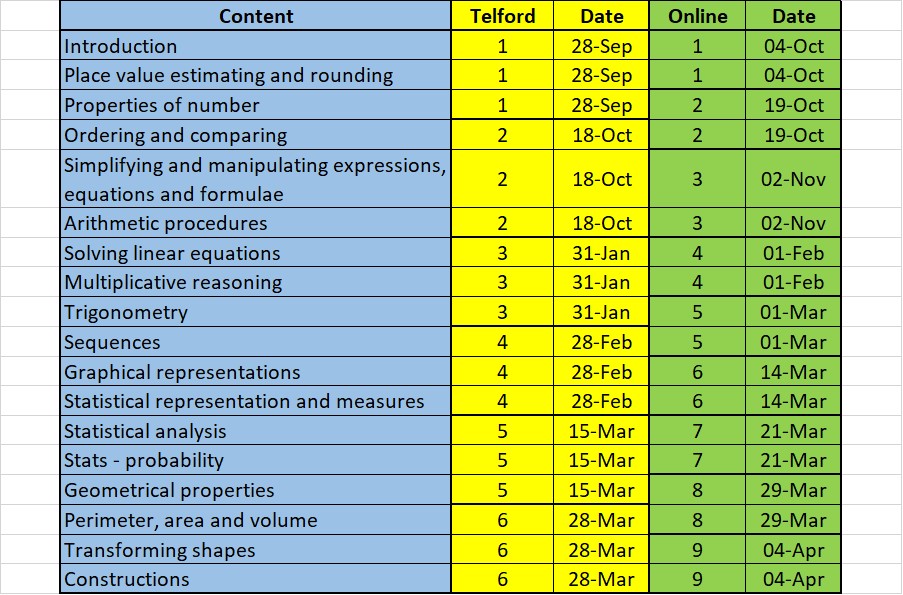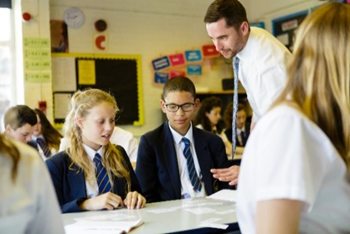Specialist Knowledge for Teaching Mathematics (Secondary non-specialists) - Telford 0930-1515
Telford TBC
There are two options for this Work Group:
1) Six full days (0930-1515) face to face in Telford
2) Nine afternoons (1345-1700) online
For the first time in 2021/22, Maths Hubs have the opportunity to provide a programme for secondary non-specialist teachers of mathematics that had previously been realised by the TSST programme, thus enabling them to understand, teach and support pupils in the maths classroom.
The outline of the programme is:

If any participants in the Telford Work Group are unable to attend one of the face to face workshops, they will be welcome to switch to the online workshops as an alternative, by arrangement.
Mathematics is a creative and highly interconnected discipline that has been developed over centuries, providing the solution to some of history’s most intriguing problems. It is essential to everyday life, critical to science, technology and engineering, and necessary for financial literacy and most forms of employment. A high-quality mathematics education therefore provides a foundation for understanding the world, the ability to reason mathematically, an appreciation of the beauty and power of mathematics, and a sense of enjoyment and curiosity about the subject (National Curriculum).

Maths Hubs are well placed to provide training for non-specialist teachers of maths so that these teachers have the opportunity to increase their knowledge and understanding of the intentions of the maths national curriculum and develop their pedagogical skills. This programme is aligned with an overall Teaching for Mastery Programme designed to develop maths teaching in secondary schools.
Who will be leading the group?
Louise Hoskyns-Staples
Louise is Assistant Maths Hub Lead (Evaluation) for SHaW Maths Hub. She worked as a researcher in mathematics assessment within the DfE and her current research interest is mathematics teacher pedagogy. Louise is a former Secondary Head of Maths, and has led many recent developments in Primary Maths Education. She led the primary mathematics ITE team at the University of Worcester, teaching and supervising student research, and providing CPD to local schools. She is well placed to share her Primary and Secondary expertise to help develop subject and pedagogical knowledge.
Who is it for?
This programme is provided for non-specialist teachers of maths in state-funded schools who fit the following definition:
A non-specialist teacher of mathematics is ‘a teacher that is currently teaching some mathematics who has not undertaken initial teacher training (ITT) in mathematics’.
This includes non-Specialist teachers that may have already been teaching Maths for several years.
If there is sufficient space in the cohort, other teachers of maths who do not fit this definition but would benefit from this support may also participate.
Do you have any non-specialist teachers in your Maths Department? Please bring this to the attention of eligible colleagues. Thank you.
What are the intended outcomes?
Pupil outcomes
Pupils will:
- develop a deep, secure and connected understanding of the maths they are learning
- achieve both conceptual understanding and procedural fluency
- enjoy maths lessons and have a positive attitude to learning the subject.
Practice development
- Non-specialist teachers of maths will explore and increase their use of a range of pedagogic approaches consistent with teaching for mastery
- Non-specialist teachers of maths will increase their confidence in planning for progression in maths.
Professional learning
Non-specialist teachers of maths will improve their subject and curriculum knowledge of secondary maths with a particular emphasis on mathematical structures in key areas.
What will it involve?
We anticipate that this Work Group will take a blended approach with some of the workshops and support being online. The location(s), frequency and length of face to face workshops will partly be determined by where participants are based.
The programme is aligned to the NCETM teaching for mastery pedagogy and is based on six key themes:
- Structure of the number system
- Operating on number
- Multiplicative reasoning
- Sequences and graphs
- Statistics and probability
- Geometry
What is the cost?
Free
Book
